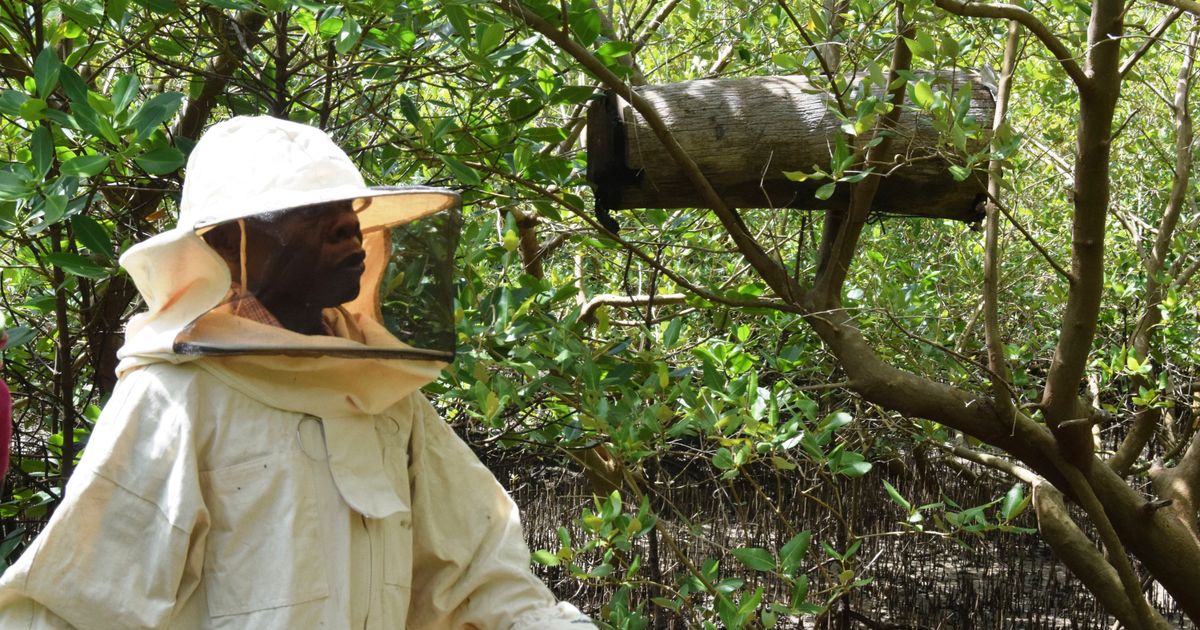MOMBASA, Kenya (AP) — Dressed in protective clothing and armed with a smoker, Peter Nyongesa walked through the mangroves to monitor his beehives along the Indian Ocean coastline.
The 69-year-old Nyongesa recalled how he would plead unsuccessfully with loggers to spare the mangroves or cut only the mature ones while leaving the younger ones intact.
“But they would retort that the trees do not belong to anyone but God,” he said.
So he has turned to deterring the loggers with bees, hidden in the mangroves and ready to sting.
Their hives now dot a section of coastline in Kenya’s main port city of Mombasa in an effort to deter people who chop mangroves for firewood or home construction. It’s part of a local conservation initiative.
“When people realize that something is beneficial to them, they do not consider the harm that comes with it,” Nyongesa said of the loggers.
Mangroves, which thrive in salty water, help in preventing erosion and absorbing the impact of severe weather events such as cyclones.
But more than half of the world’s mangrove ecosystems are at risk of collapse, according to the first global mangrove assessment for the International Union for Conservation of Nature Red List of Ecosystems released in May.
Mangroves are threatened by illegal logging, climate change and rising seas, pollution and urban development. According to a Kenya environment ministry report in 2018, about 40% of mangroves along the Indian Ocean coast are degraded.
In Mombasa county, it’s estimated that almost 50% of the total mangrove area there — 1,850 hectares (4,570 acres) — is degraded.
Such overall degradation has slowed in Kenya, which in 2017 developed a 10-year plan to have community conservation efforts manage mangroves. But the efforts have been incomplete because of inadequate resources.
Communities are doing what they can. James Kairo, a research scientist at the Kenya Marine and Fisheries Research Institute, said initiatives such as beekeeping are helping. Their honey also brings in community income.
“Mangrove honey is also classified as top quality and medicinal,” he added. “This could be due to the environment that mangroves thrives in” and what they absorb from their surroundings.
Nyongesa now has 11 beehives and harvests about 8 liters (2 gallons) of honey per hive every three months. Each liter earns him $6, a valuable source of income.
When Nyongesa started beekeeping 25 years ago, he didn’t know anything about the threat to mangroves or how his bees could help.
He became involved in 2019, when he joined a local conservation group called Tulinde Mikoko, Swahili for Let’s Protect Mangroves. The group adopted his beekeeping as a community initiative along with mangrove planting. Members also serve as custodians of the mangroves and try to stop loggers.
The group has concealed beehives in the top branches of mangroves as silent guardians. The bees are meant to attack unsuspecting loggers.
“We positioned them at the peak where they can’t be spotted with ease,” said Bibiana Nanjilula, the Tulinde Mikoko founder. “As such, when the loggers start cutting down whichever tree, the bees will attack due to the noise.”
The group hopes the tactic is working but has found it hard to measure its effects in the relatively difficult to access areas.
The bees also play a crucial role as pollinators. As they forage among the mangrove flowers, they transfer pollen from one flower to another, facilitating plants’ reproduction.
“The healthier the mangroves are, probably the more productive the honey production will be,” said Jared Bosire, project manager for the UNEP-Nairobi Convention, who said they encourage the integration of livelihoods with conservation. The office is a project of the United Nations Environment Program, based in Nairobi.
Kenya has 54,430 hectares (134,500 acres) of mangroves remaining, and they contribute $85 million per year to the national economy, according to a report by the Global Mangrove Alliance in 2022.
___
For more on Africa and development: https://apnews.com/hub/africa-pulse
___
The Associated Press receives financial support for global health and development coverage in Africa from the Bill & Melinda Gates Foundation Trust. The AP is solely responsible for all content. Find AP’s standards for working with philanthropies, a list of supporters and funded coverage areas at AP.org.
